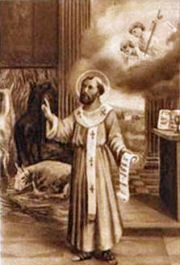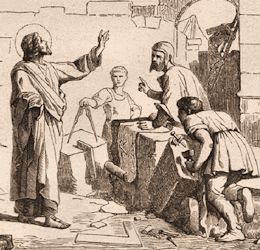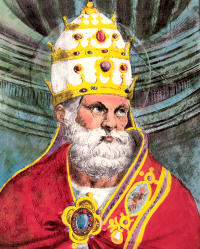Ordinary Time: January 16th
Thursday of the First Week of Ordinary Time
» Enjoy our Liturgical Seasons series of e-books!
Old Calendar: St. Marcellus, pope and martyr; St. Honoratus, archbishop (Hist)
According to the 1962 Missal of St. John XXIII the Extraordinary Form of the Roman Rite, today is the feast of St. Marcellus who was elected Pope just at the time when Diocletian had spent somewhat his first violence against the Church. In Rome he reorganized the Catholic hierarchy disrupted by the persecution. He was exiled and put to labor. He is considered a martyr as he died in 309 because of his treatment during his exile.
Historically today is the feast of St. Honoratus who was born in Gaul (modern France) about 350, and came from a distinguished Roman family. After a pilgrimage to Greece and Rome, he became a hermit on the isle of Lerins, where he was joined by Sts Lupus of Troyes (July 29), Eucherius of Lyons (November 16), and Hilary of Arles (May 5), among others.
St. Marcellus Diocletian's terrible persecution had taken its toll. It was reported that within a period of thirty days, sixteen thousand Christians were martyred. The Church in Rome was left scattered and disorganized, and the Holy See remained vacant for over two years. It wasn't until the ascension of Emperor Maxentius and his policy of toleration that a pope could be chosen. Marcellus, a Roman priest during the reign of Marcellinus, was elected.
Diocletian's terrible persecution had taken its toll. It was reported that within a period of thirty days, sixteen thousand Christians were martyred. The Church in Rome was left scattered and disorganized, and the Holy See remained vacant for over two years. It wasn't until the ascension of Emperor Maxentius and his policy of toleration that a pope could be chosen. Marcellus, a Roman priest during the reign of Marcellinus, was elected.
The new pope was confronted with enormous problems. His first challenge was to reorganize the badly shaken Church. He is said to have accomplished this by dividing Rome into twenty-five parishes, each with its own priest. The next task was more challenging. Once again a pope was faced with the problem of what to do with the many brethren who had compromised their faith during the reign of Diocletian. Marcellus upheld the doctrine of required penance before absolution. The apostates keenly desired readmission to communion, but they violently opposed the harshness of the penance demanded by the rigorist, Marcellus. Riots broke out throughout the city, and even bloodshed, to the point that Emperor Maxentius intervened. He believed that the pontiff was the root of the problem, and in the interest of peace, he banished Marcellus; the pope died a short time later. Apart from persecution, this was the first time that the secular government was known to have interfered with the Church. There is some confusion whether his body was brought back to Rome or whether he was allowed to return to the Holy See before his death. There is no doubt, however, that he was buried in the cemetery of Priscilla on the Via Salaria.
Symbols: Pope with a donkey or horse nearby; pope standing in a stable.
St. Honoratus St. Honoratus was of a consular Roman family settled in Gaul. In his youth he renounced the worship of idols, and gained his elder brother, Venantius, to Christ. Convinced of the hollowness of the things of this world, they wished to renounce it with all its pleasures, but a fond pagan father put continual obstacles in their way. At length, taking with them St. Caprais, a holy hermit, for their director, they sailed from Marseilles to Greece, with the intention to live there unknown in some desert.
St. Honoratus was of a consular Roman family settled in Gaul. In his youth he renounced the worship of idols, and gained his elder brother, Venantius, to Christ. Convinced of the hollowness of the things of this world, they wished to renounce it with all its pleasures, but a fond pagan father put continual obstacles in their way. At length, taking with them St. Caprais, a holy hermit, for their director, they sailed from Marseilles to Greece, with the intention to live there unknown in some desert.
Venantius soon died happily at Methone, and Honoratus, being also sick, was obliged to return with his conductor. He first led a hermitical life in the mountains near Frejus. Two small islands lie in the sea near that coast; on the smaller, now known as St. Honoré, our Saint settled, and, being followed by others, he there founded the famous monastery of Lerins, about the year 400. Some of his followers he appointed to live in community; others, who seemed more perfect, in separate cells as anchorets. His rule was chiefly borrowed from that of St. Pachomius.
Nothing can be more amiable than the description St. Hilary has given of the excellent virtues of this company of saints, especially of the charity, concord, humility, compunction, and devotion which reigned among them under the conduct of our holy abbot.
He was, by compulsion, consecrated Archbishop of Arles in 426, and died, exhausted with austerities and apostolical labors, in 429.
Excerpted from Lives of the Saints, by Alban Butler, Benziger Bros. ed. [1894]
